#fitd
Text
ever thought that less roleplaying games should be about loveable fantasy heroes saving the world and more of them should be about pathetic and petty aristocrats trapping each other in concentric layers of convoluted madcap scheming? well good news, my ttrpg most trusted advisors is on sale again! it's a silly pseudomedieval pastiche optimised for playing low-prep, light-hearted one-shots as a party of characters at the intersection between lord vetinari, blackadder, and the gang from it's always sunny, and it's 50% off through to the 26th of december!
706 notes
·
View notes
Text
"What's the difference between 'Powered By the Apocalypse' and 'Forged in the Dark'" well, you see, the Apocalypse Engine is what convinced indie game designers that character classes are cool again, and Blades in the Dark is what convinced indie game designers that going directly from writing diceless one-page storygames to writing something with Dungeons & Dragons level crunch with absolutely no ramp-up is a reasonable aspiration.
#gaming#tabletop roleplaying#tabletop rpgs#game design#indie games#blades in the dark#apocalypse world#pbta#fitd
1K notes
·
View notes
Text
Have you played MOST TRUSTED ADVISORS ?
By W.S. Healed & Citizen Abel / The Horizon Machine @thehorizonmachine
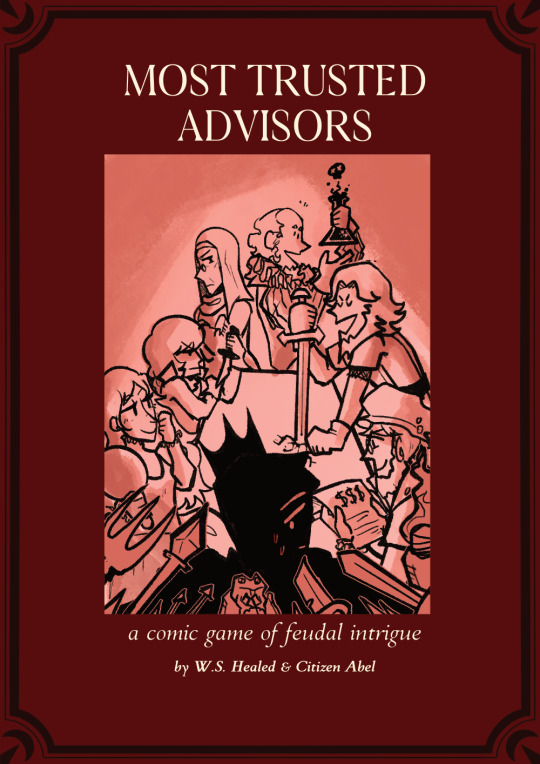
In Most Trusted Advisors, you’ll play as a profoundly incompetent monarch’s eponymous privy council. As lords and ladies of the realm, you’ll be tasked with keeping your liege safe from foreign agents, court conspiracies, and their most dangerous enemy: their own incompetence.
One player will take the role of your liege, responsible for telling you about the disasters your characters must deal with as well as the Misfortunes that befall them when they fail. The rest of you will pick up one of six playbooks and play scheming, petty, self-interested nobles. You’ll try desperately to keep your liege alive, stay in their good graces, and keep the story unpredictable by introducing Twists.
Together, you’ll tell a story of self-interested aristocrats getting themselves into trouble by being selfish, malevolent, incompetent, or all of the above. Play to find out if your lords and ladies can keep their liege in good health and their heads on their bodies, or if they’ll be crushed under the weight of their own schemes.
#ttrpg#tabletop rpg#poll#poll time#indie ttrpg#2020s#indie rpg#most trusted advisors#forged in the dark#fitd
162 notes
·
View notes
Text
This is a fucking BEAUTIFUL example of what makes Flashbacks such a good mechanic, and also why free flashbacks are important to have.
149 notes
·
View notes
Text
Character Spreadsheets

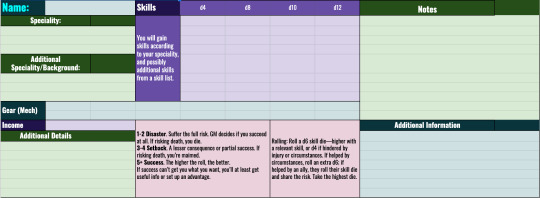
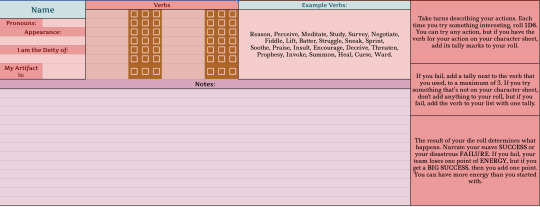
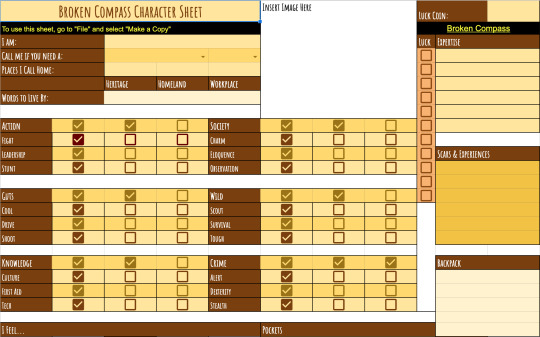

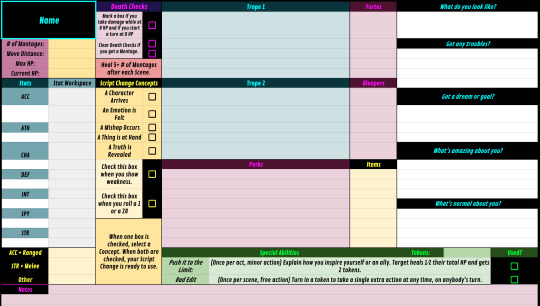

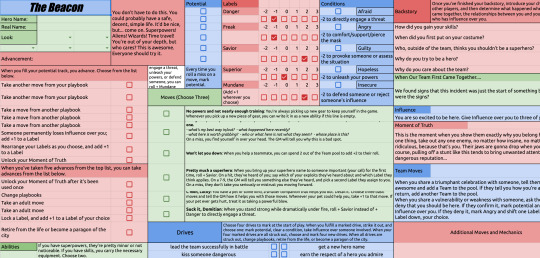

Hello!
For folks who don't know me, my name is Mint, and when I'm not recommending ttrpgs, I like to design play-kits for different ttrpg games to facilitate easier online play. These player kits are designed to be shared with a playgroup in which everyone has editing access, with either character templates that can be duplicated, or a list of playbooks for games that use those instead.
I've finally collected all of my useable play-kits into one folder, which I am sharing below for anyone to use. If you would like to use one of these, open up the file. Then select "File" -> "Make a Copy".
I have included a tab on many of these games that is labelled "Lines, Veils & Lures." This is a modified version of Lines & Veils that my table uses that incorporates Lures, which are things that the group wants to see in game.
Most sheets also include a link to where you can get the game they are made for, up in the top row of the sheet. So if you see a play-sheet you like, you can find the game pretty easily from there!
I've done sheets for big games like Numenera, and little games like Cryptid TV. I'm always working on more, so there will be more that are added to this folder over time. I'll probably also be editing these sheets themselves as I update sections, add links, and incorporate more Lines, Veils & Lures!
You can check out the sheets here!
#spreadsheets#ttrpg resources#character sheets#blades in the dark#numenera#thirsty sword lesbians#world of darkness#pbta#fitd#game resources#dnd
717 notes
·
View notes
Text
End of the year WINTER SALE!
Need a last minute gift for the TTRPG appreciator in your life? Want to try out a weird new game? Love the joy and thrill of purchasing and downloading a PDF?
Well then I have you covered, because from now until January 5th, 2024, a bunch of my stuff is on sale!


Wow! Just look at those fancy graphics.
I'll be adding to this post to highlight what's what over the next several days but in case you wanted an idea of what you can get; games range from posthuman megastructure dystopia dungeon delves, liminal backroom crawls, action-fashion adventure, magical grad school hijinks, and supernatural mystery building.
Truly, the perfect seasonal offerings!
Anyways, link below (and also above);
Happy Holidays and New Year!
92 notes
·
View notes
Text
When people talk about Blades in the Dark they usually bring up a few big headline mechanics (flashbacks, clocks, load, position/effect etc) and they should because they are really good mechanics. But there are a lot of little things in blades that I think are really important for creating the whole experience and in some cases not all though) are unusual in ttrpgs. SO I thought I'd list some them.
You can't leave:
The 'standard' (but not universal) mode for ttrpgs is 'the adventure' where you travel from place to place seeing new stuff, meeting different people, looting new ruins, solving new problems etc. There might be a hub that you often return to but generally roving about is a core element. And its obvious why this is appealing! But it has two downsides: 1) the players can very easily run away from the consequences of their actions and 2) and the players are constantly being faced with new stuff that they don't really have the hooks to latch onto yet.
In contrast Doskvol is a pressure cooker. Want to leave? Tough! the whole world out there is dead and will kill you. Everything you do will create more characters and plot hooks and conflicts all ready to be pulled into the narrative at any point. If you piss off another faction you can't just skip town, you have to face up to the consequences of your actions. And as you play the players will become more and more immersed in the city and develop a deep understanding of what it going on there.
2. You're a gang of criminals:
A common (again, not universal) base assumption of many games is that you are good guys doing fundamentally heroic things. And this tends to encourage a somewhat reactionary style of play where you are presented with a bad thing that is happening and then attempt to resolve it. In contrast being criminals is a much more proactive endeavor. There isn't a clear threat that needs to be overcome. There's just a situation and its up to you to get what you want out of it.
The scope of play available when you are playing as scoundrels rather than heros is also so much wider. Note you aren't evil, which is equally restrictive. You will do good things and bad things, and struggle so much more with the question of when you can afford to be good and just how bad you are willing to be. You don't just always step up to save the world but instead pursue the things that actually matter to your character, because being a criminal allows your character to be selfish in a way a hero can't be and that massively helps in creating a player driven game.
But you aren't just criminals, you're a gang of criminals, with shared goals and resources and a character sheet to go with it. This really forges a group identity that transcends what is possible in the traditional party (which is essentially just a group of individuals who happen to be in the same place). The crew gives everyone at the table a clear basic goal: build your crew; expand your crime empire. And this is a fundamentally player driven goal! Normally systems reserve this sort of 'domain level' play for high level characters (ie the ones most people never play) but blades puts you there right from the off.
3. Experience:
At the end of each session you go round the table and discuss instances of when each player 'addressed a challenge with [core activities of their playbook]', 'expressed their beliefs, drives, heritage, or background', or 'You struggled with issues from their vice or traumas during the session'. This is incredibly lightweight but also very effective.
Firstly it means everyone at the table is always going to be thinking about and making space for expression of their character and creating problems which is something that can easily be sidelined in favor of optimally addressing the challenges you are facing when there isn't this codified incentive.
And secondly the fact that it is at the end of the session creates this great debrief situation where you go over the highlights of the session and maybe dig a little deeper into why your character acted in the ways they did, which just brings the whole table into having a deeper understanding of each others characters. Again, notice 'drives' as a potential XP trigger. The game rewards (and therefore encourages) motivated characters.
In addition of personal XP you also have crew XP with a similar set of triggers (goals and drives come up again), which really supports building a crew identity, encouraging the crew to be proactive, and centering it as 'the main character' of the game.
4. Rivals:
The concept of rivals only gets a few words in the Blades rules. It appears on each playbook with a list of potential rivals (Just a name and a couple of words of description each) and then again it appears on when you are setting up a scenario in a sentence saying 'Are any enemies or rivals interfering in the operation?' That's barely enough to call it a mechanic. But its incredibly effective! You automatically get a small cast of revolving antagonists, each with some personal connection to a player character, who just keep popping up and causing problems. And 'oh shit, not this guy again! I hate this guy!' is a really great way to tie things together and get players invested in what's going on.
5. Just enough world building:
Blades gives you quite a lot of material to work with on the world of Doskvol. Certainly enough to build out the broad picture. But it is also absolutely chock full of (deliberate) gaps. What this leaves is for you to fill in the gaps to create your version of Doskvol (And it can be quite fun to compare notes with other groups playing blades). The book tells you there is a conspiracy in a faction but it won't tell you who's behind it. The book tells you people are gathering ancient artifacts, but it won't tell you where they come from or what exactly they do. And this means that you can easily set the answer to be whatever would be appropriate for your game. Or even discover the answer through playing!
The book being full of prompts but largely devoid of answers is a very useful tool for the somewhat free form, improvisational style of the game because there will always be things to inspire you but you never need to worry and pausing the game to check what the official stance on something is.
-----------------------------------------------------------------------------------
In general I think the sort of thing I have been talking about is something blades excels at: really lightweight elements that end up having significant impact. A final example of that is the trauma system, which is essentially two sentences long:
If you get too much stress you get a trauma ( one of: cold, haunted, obsessed, paranoid, reckless, soft, unstable, viscous). If you struggled with issues from your trauma this session, gain an xp.
And from that very simple mechanic flows characterisation, character development, and the players deliberately creating more problems for themselves!
Anyway, that's what comes to mind at the moment. I'll add more stuff if I think of it.
You should play Blades in the Dark, its very good.
988 notes
·
View notes
Text
Get MOST TRUSTED ADVISORS at a LORDLY PRICE!
Hear ye, hear ye! Itch.io, those fine purveyors of princely manuscripts and amusements, have declared that today they will not longer collect their dastardly tithe upon this dreadful day of plagues known as 'black Friday'.
This means our comic production, Most Trusted Advisors, the dice-playing merriment game of roles and betrayal, is now available at the sort of price you can usually only negotiate through pillaging or leveraging generational wealth!
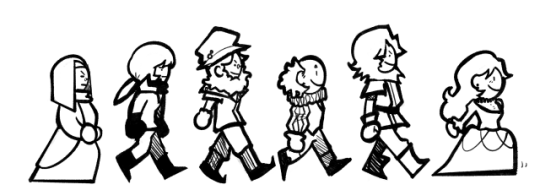
WHAT IS MOST TRUSTED ADVISORS?
Most Trusted Advisors is a tabletop roleplaying game, crafted by the finest computer artisans for all your madcap, absurdist, feudal comedy one-shot or short campaign needs. From the dastardly Blackguard to the hopelessly naive Lover, pick one of the game's six playbooks and roleplay as the untrustworthy, scheming council to a bumbling Liege.

Betray the king! Usurp the throne! Catch smallpox! Tell dire tales of intrigue and betrayal! Catch smallpox again even though you thought you were immune! All these roleplaying experiences and more will become available to you with the purchase of our fine manuscript, which is 50% OFF until Tuesday, 28th of November. It's guaranteed to get your soul into heaven!*
*Purchasing MOST TRUSTED ADVISORS is not a recognized indulgence in the eyes of most certified bishops. Please consult your local clergyman.
109 notes
·
View notes
Text

Pretty happy with how the ‘Start of session’ move is shaping up.
97 notes
·
View notes
Text
Earth was radiant
Machines made work irrelevant
Cities were built in a day
Life was good
...well, for the wealthy, at least
Then one day, something happened, what exactly? who knows, who cares. (Well, it was the climate apocalypse)
Now, it's all gone, and the ruins of mankind are ripe for rebuilding
it's time to take back the world, this time, try to not fuck it up.
Songs for the dusk is a FITD game about rebuilding society after major cataclysms destroyed everything, rebuild the world, one kind gesture at a time
35 notes
·
View notes
Text
In the last few days, I've now had two run-ins with people on this site regarding the idea of a TTRPG's mechanics and rules impacting the roleplay aspect of said game. And from what I can tell, these people - and people like them - have the whole concept backwards.
I think people who only ever played D&D and games like it, people who never played a Powered by the Apocalypse or Forged in the Dark system, or any other system with narratively-minded mechanics, are under one false impression:
Mechanics exist to restrict.
Seeing how these people argue, what exactly they say, how they reason why "mechanics shouldn't get in the way of roleplaying," that seems to be their core idea: Rules and mechanics are necessary evils that exist solely to "balance" the game by restricting the things both players and GMs can do. The only reasons why someone would want to use mechanics in their RPG is to keep it from devolving into
"I shot you, you're dead!"
"No, I'm wearing bulletproof armor!"
"I didn't shoot bullets, I shot a laser!"
"Well, the armor's also laserproof!"
"Nuh-uh, my lasers are so hot that they melt any armor!"
"My armor's a material that can't melt!"
And so on. Because we have rules, the players can't just say "we beat this challenge", and neither can the GM say "you haven't beaten this challenge." Because the rules are clear, the rules are obvious, the rules tell you what you can and can't do, and that's it.
So obviously, when the idea of mechanics directly interacting with the roleplay - generally seen as the most free and creative part of a TTRPG - seems at best counterintuitive, at worst absolutely wrong. Hearing this idea, people might be inclined to think of a player saying "I'm gonna do X", just for the evil, restrictive mechanics to come in and say "no, you can't just do X! you first have to roll a Do X check! But you also did Y earlier, so you have to roll the Did Y Penalty Die, and if that one comes up higher than your Do X die, you have to look at this table and roll for your Doing X If You Previously Did Y Penalty! But, if you roll double on that roll..."
But like... that's not how it works. Roleplay-oriented mechanics don't exist to restrict people from roleplaying, they're there to encourage people to roleplay!
Let's go with a really good example for this: The flashback mechanic from Blades in the Dark (and games based on Blades in the Dark).
In BitD, you can declare a flashback to an earlier point in time. Could be five minutes ago, could be fifty years ago, doesn't matter. You declare a flashback, you describe the scene, you take some stress (the equivalent of damage) and now you have some kind of edge in the present, justified by what happened in the flashback. For example, in the Steeplechase campaign of the Adventure Zone podcast, there was a scene where the PCs confronted a character who ended up making a scandalous confession. One of the players declared a flashback, establishing that, just before they walked in, his character had pressed the record button on a portable recording device hidden in his inner coat pocket. Boom, now they have a recording of the confession.
How many times have you done something like this in a D&D game? How many times did your DM let you do this? I think for most players, that number is pretty low. And for two reasons:
The first, admittedly, has to do with restrictions. If you could just declare that your character actually stole the key to the door you're in front of in an off-screen moment earlier, that would be pretty bonkers. Insanely powerful. But, because BitD has specific mechanics built around flashbacks, there are restrictions to it, so it's a viable option without being overpowered.
But secondly, I think the far more prevalent reason as to why players in games without bespoke flashback mechanics don't utilize flashbacks is because they simply don't even think of them as an option. And that's another thing mechanics can do: Tell players what they (or their characters) can do!
Like, it's generally accepted that the players only control what their characters do, and the GM has power over everything else. That's a base assumption, so most players would never think of establishing facts about the larger world, the NPCs, etc. But there are games that have explicit mechanics for that!
Let's take Fabula Ultima as another example: In that game, you can get "Fabula Points" through certain means. They can then spend those points to do a variety of things. What's literally the first thing on the list of things Fabula Points let you do? "Alter the Story - Alter an existing element or add a new element." I've heard people use this to decide that one of the enemies their group was just about to fight was actually their character's relative, which allowed them to resolve the situation peacefully. I again ask: In your average D&D session, how likely is it that a player would just say "that guy is my cousin"? And if they did, how likely is it that the GM accepts that? But thanks to the Fabula Point mechanic making this an explicit option, thanks to rules explicitly saying "players are allowed to do this", it opens up so many possibilities for story developments that simply would not happen if the GM was the only one allowed to do these things.
And it's only possible because the mechanics say it is. Just how your wizard casting fireball is only possible because the mechanics say it is.
#ttrpg#ttrpgs#tabletop rpg#tabletop rpgs#blades in the dark#forged in the dark#bitd#fitd#fabula ultima
11 notes
·
View notes
Text
underside: dev diary #5
today i put out a new underside dev diary on my patreon. this one is about the fracture clock, the system's semi-mandatory pvp element. as usual, this means that last week's dev diary, on teams and their ideologies is free for everyone to read!
for anyone not in the know, underside is my work-in-progress dark superhero ttrpg focused on exploring trauma, escalating conflicts, and fast-paced action based around cool power interactions more than statblocks--what masks is to teen titans, i want underside to be to worm. i've been working on it for about two years now and released a much earlier draft under the name capes in the dark--i'm currently hoping to release a feature-complete playtest pdf in early 2024.
50 notes
·
View notes
Text
Looking back at my itch.io page and i'm really proud of all the Beam Saber playbooks I made. I think they all fuck extremely hard in their own unique ways.




These were a great learning experience in both game design and layout.
41 notes
·
View notes
Text
Have you played SCUM AND VILLAINY
By Stras Acimovic and John LeBoeuf-Little
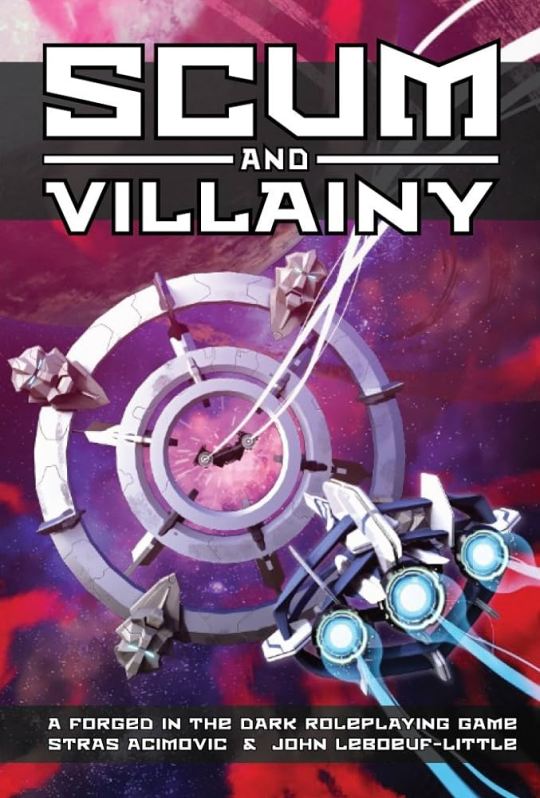
A Forged in the Dark game about a spaceship crew trying to make ends meet under the iron-fisted rule of the Galactic Hegemony.
201 notes
·
View notes
Text
The Gift of Dice - Intro Post
I am Gabriel Caetano (they/them), and I am a queer, Latine parent, TRPG creator, audio producer, and game facilitator (aka GM) from Brazil.
Roleplaying Games
I make tabletop Roleplaying Games, as well as TTRPG-adjacent experiences.
I like fantasy, science fantasy, and weird fantasy the most and I have been more and more invested in looking at games as enablers of social experimentation and questioning.
I like to say that every game I make is a product of excellent taste and developing skill.
You can find my games at https://thegiftofdice.itch.io/

Indie Games Facilitator for Hire
I run and facilitate (aka GM) roleplaying games as a gig.
I have over 100 session under my belt, and growing, and a large catalogue of indie, alternative games to facilitate for players anywhere out there in the world, including Masks, Thirsty Sword Lesbians, Nibiru, Apocalypse Keys, Noctis Labyrinth, Troika!, Blades in the Dark, CBR+PNK, and many more.
You can browse through the dates I setup, or make a custom request.
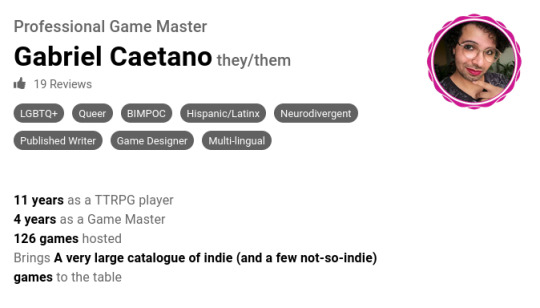
Politics and Ethics
All TTRPG content has a price tag, except when I think it shouldn't, and all of them should have alternate methods of access for anyone who does not enjoy the privilege of earning dollars, euros, pounds, and other hegemon currencies.
Yet, non-white people, non-het, and non cis-male people anywhere who cannot afford to buy anything I make without putting their safety and well-being financially are welcome to get my stuff for free, one way or another.
I also offer seats for free or at a greatly reduced fee to people in the Global South, where the dollar exchange would make access to my game sessions absolutely crushing.
None of the content I create is compatible with Hasbro or Paizo products, or products by any company or individual that shares their ethics and predatory approach to industrializing an art form, on principle.
Additionally I do not use or rely on artificially generated content to create my games or run my sessions.
Game Design Principles
I've come across this game design manifesto and I've decided to adopt it for my own game design as best as I can and let it evolve as I grow as a game designer and writer.
against coercion: a game design manifesto by JPLeBreton
let players wonder about things and trust them to find answers;
connect players with patterns they find intrinsically fulfilling;
never treat a number going up as an inherently positive or meaningful even;
teach respect for the autonomy and boundaries of all things;
posit alternatives to fantasies of accumulation and extraction;
do not think of emotional responses as something you extract from players;
produce and distribute ethically;
aspire to more than escape.
Whether I'll succeed or fail at following these principles, or even how they will evolve over time, all I can say is let's play to find out.
Kindly,
Gabriel Caetano
#indie ttrpg#ttrpg#paid gm#pbta#tabletop#ttrpg design#rpglatam#looking for players#fitd#thirsty sword lesbians#apocalypse keys#nibiru rpg#avatar legends#Latine#Latin America#brazil#brasil#role playing games#ttrpg community#ttrpg commissions#fantasy#weird fantasy#science fantasy#sci fi and fantasy#science fiction#wanderhome#apocalypse world
45 notes
·
View notes
Text
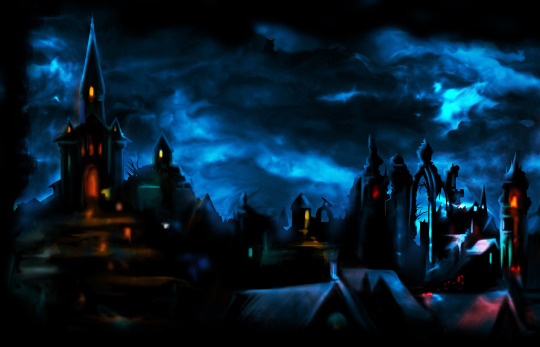
Make Your Own City in the Dark
Over on Age of Ravens I (edige23) am back to blogging. This time I've put together a toolkit and list for collaboratively building your own unique and weird city for a Blades in the Dark campaign.
It has discussion and pick lists for:
Environment
Geography and Form
Disasters and Threats
Magic
Technology
Faction Building
Weird Locales
This is intended for games like Dishonored or Blades in the Dark but could easily be adapted to other games.
15 notes
·
View notes